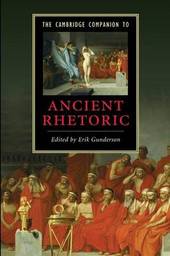
|
The Cambridge Companion to Ancient Rhetoric
Paperback / softback
Main Details
| Title |
The Cambridge Companion to Ancient Rhetoric
|
| Authors and Contributors |
Edited by Erik Gunderson
|
| Series | Cambridge Companions to Literature |
|---|
| Physical Properties |
| Format:Paperback / softback | | Pages:370 | | Dimensions(mm): Height 227,Width 150 |
|
| Category/Genre | Literary studies - classical, early and medieval
Western philosophy - Ancient to c 500 |
|---|
| ISBN/Barcode |
9780521677868
|
| Classifications | Dewey:808.0938 885.0109 |
|---|
| Audience | | Tertiary Education (US: College) | | Professional & Vocational | |
|---|
| Illustrations |
Worked examples or Exercises
|
|
Publishing Details |
| Publisher |
Cambridge University Press
|
| Imprint |
Cambridge University Press
|
| Publication Date |
9 July 2009 |
| Publication Country |
United Kingdom
|
Description
Rhetoric thoroughly infused the world and literature of Graeco-Roman antiquity. This Companion provides a comprehensive overview of rhetorical theory and practice in that world, from Homer to early Christianity, accessible to students and non-specialists, whether within classics or from other periods and disciplines. Its basic premise is that rhetoric is less a discrete object to be grasped and mastered than a hotly contested set of practices that include disputes over the very definition of rhetoric itself. Standard treatments of ancient oratory tend to take it too much in its own terms and to isolate it unduly from other social and cultural concerns. This volume provides an overview of the shape and scope of the problems while also identifying core themes and propositions: for example, persuasion, virtue, and public life are virtual constants. But they mix and mingle differently, and the contents designated by each of these terms can also shift.
Author Biography
Erik Gunderson is Associate Professor in the Department of Classics at the University of Toronto. He is the author of Staging Masculinity: The Rhetoric of Performance in the Roman World (2000); Declamation, Paternity and Roman Identity: Authority and the Rhetorical Self (2003); and Nox Philologiae: The Fantasy of the Roman Library (2008).
|